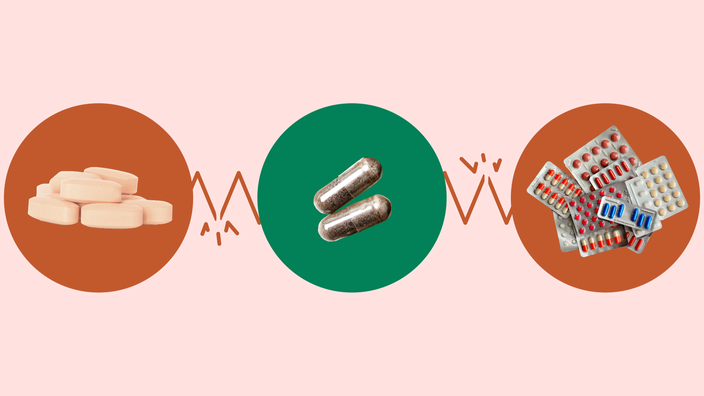
12 St. John’s Wort Interactions You Should Know About
Key takeaways:
St. John’s wort is a dietary supplement that’s marketed for symptoms of depression. It’s notorious for medication interactions. Antidepressants, benzodiazepines, and birth control pills are examples of interacting medications.
St. John’s wort tends to make other medications less effective. But, in some cases, it can enhance the effects of other medications, leading to more side effects.
Make sure to keep an up-to-date medication list handy. This helps your prescriber and pharmacist screen for potential interactions.
Table of contents

St. John’s wort is an herb that’s taken for various health conditions. It’s most commonly marketed as an antidepressant. But it has also gained popularity for other conditions, such as obsessive-compulsive disorder (OCD), menopause symptoms, and psoriasis.
Similar to other over-the-counter (OTC) dietary supplements, St. John’s wort isn’t FDA approved for any condition. But some people find St. John’s wort to be helpful, even though it has some risks associated with it.
If you’re thinking about taking St. John’s wort, it’s important to know about some of the potential interactions it has with other medications.
Search and compare options
Why St. John’s wort interactions happen
St. John’s wort interferes with certain enzymes (proteins) that break down medications in your body. In most cases, this causes other medications to be less effective. In other cases, St. John’s wort can enhance the effects of other medications, leading to more side effects.
Twelve of the top St. John’s wort interactions are included in this list. But even if a medication you take isn't on this list, there may still be an interaction. Be sure to talk to your pharmacist to rule out any conflicts with your medication routine.
1. Antidepressants
St. John’s wort can raise serotonin levels in the brain, which is why it’s sometimes used as an antidepressant. But many prescription antidepressants also do this.
The chart below shows some of the main antidepressants that St. John’s wort interacts with.
| Antidepressant type | Examples |
|---|---|
| Selective serotonin reuptake inhibitors (SSRIs) |
|
| Serotonin and norepinephrine reuptake inhibitors (SNRIs) |
|
| Monoamine oxidase inhibitors (MAOIs) |
|
Taking St. John’s wort with a prescription antidepressant can cause excessive levels of serotonin in your brain. This could lead to serotonin syndrome. Symptoms of serotonin syndrome can range from mild to life-threatening. If you take these medications together, several toxicity symptoms are possible, such as:
Abnormal sweating
Fast heart beat
Fast breathing
Muscle spasms
Agitation
Shaking
Confusion
Restlessness
Most prescription antidepressants shouldn’t be taken with St. John’s wort due to these risks. Be sure to contact a healthcare professional immediately if you experience any of these symptoms.
An informed decision: There’s a lot to know about St. John’s wort. Here’s a summary of what to keep in mind before purchasing a bottle.
St. John’s wort dosages: Review how much St. John’s wort is recommended and tips for choosing a high-quality supplement.
Natural ways to fight depression: Learn about small lifestyle changes that can have a big impact on your mood.
2. Migraine medications
Triptans and calcitonin gene-related peptide (CGRP) receptor blockers are medications used to treat migraines.
Combining St. John’s wort with triptans can cause high levels of serotonin in your body. Just like with antidepressant medications, this raises the odds of serotonin syndrome occurring.
St. John’s wort interacts with CGRP receptor blockers differently. Instead, St. John’s wort makes them break down faster, causing them to be less effective at managing migraines.
Read more like this
Explore these related articles, suggested for readers like you.
Some migraine medications St. John’s wort potentially interacts with are shown in the chart below.
| Medication type | Examples |
|---|---|
| Triptans |
|
| CGRP receptor blockers |
|
It’s not recommended to take St. John’s wort with migraine medications. Even if your migraine medication isn’t listed here, check with your prescriber or pharmacist to make sure it doesn’t interact with St. John’s wort.
3. Benzodiazepines
Benzodiazepines are controlled substances that treat anxiety. St. John’s wort can make benzodiazepines less effective by accelerating their breakdown in the liver. This causes benzodiazepines to have less of a calming effect.
These are some common examples of benzodiazepines that interact with St. John’s wort:
Alprazolam (Xanax)
Clonazepam (Klonopin)
Diazepam (Valium)
Lorazepam (Ativan)
It’s not recommended to combine benzodiazepines and St. John’s wort.
4. Warfarin
Warfarin (Coumadin, Jantoven) is a blood thinner used to treat and prevent blood clots. St. John’s wort can lower the amount of warfarin in your body. This means that you may have a higher risk of clotting.
A lot of monitoring goes into taking warfarin. People who take warfarin have to monitor their risk of clotting or bleeding by scheduling routine blood tests to see how “thick” or “thin” their blood is.
If you start or stop taking St. John’s wort while taking warfarin, let your prescriber know. They may need to test your blood more often and adjust your warfarin dosage if needed.
5. DOACs such as Xarelto
DOACs (direct-acting oral anticoagulants) are another type of blood thinner. They work differently than warfarin, and they’re a bit newer. Four of them are available: Eliquis (apixaban), Xarelto (rivaroxaban), Pradaxa (dabigatran), and Savaysa (edoxaban). All of them interact with St. John’s wort.
St. John’s wort can make DOACs less effective. This interaction increases the risk of developing a blood clot. It’s best to avoid combining them.
6. Digoxin
Digoxin (Lanoxin) is a prescription medication that treats heart failure and heart rhythm changes related to atrial fibrillation.
When taken together, St. John’s wort can lower digoxin levels in the body. This, in turn, causes digoxin to be less effective and can lead to less control over heart-related symptoms that digoxin treats.
Similar to warfarin, digoxin requires regular blood testing to make sure your levels are within range. Your prescriber may want to test the levels of digoxin in your blood and make dosage adjustments as needed.
7. Statins
Statins are commonly-prescribed medications for lowering cholesterol. Some of them, such as atorvastatin (Lipitor) and simvastatin (Zocor, FloLipid), potentially interact with St. John’s wort. Rosuvastatin (Crestor) and lovastatin (Altoprev) can, too.
St. John’s wort can make these statins less effective. If you need to combine these treatments, your prescriber may recommend raising your statin dosage. But don’t adjust your dosage without talking to them first.
Not all statins interact with St. John’s wort. If you’re taking pravastatin or fluvastatin (Lescol XL), there shouldn’t be an issue. Your body breaks down these medications differently than other statins.
8. Antiseizure medications
Antiseizure medications, also known as antiepileptics, can interact with St. John’s wort. These medications are prescribed to prevent and treat seizures. St. John’s wort lowers the levels of many antiseizure medications in the body, making them less effective. This leads to less seizure control.
Some examples of antiseizure medications that interact with St. John’s wort are phenytoin (Dilantin, Phenytek), carbamazepine (Tegretol), and phenobarbital. Due to the risk of seizures, don’t take St. John’s wort with these medications.
9. Birth control pills
Birth control pills can interact with St. John’s wort. St. John’s wort causes these medications to break down faster in the liver, making them less effective. Taking St. John’s wort with oral birth control can lead to unplanned pregnancies and breakthrough bleeding.
This interaction mostly applies to oral contraceptives. There’s limited data on the effects of St. John’s wort on other birth control methods, such as intrauterine devices (IUDs), vaginal rings, and skin patches. But you should still be cautious.
10. HIV medications
St. John’s wort interacts with two main types of HIV medications: protease inhibitors and non-nucleoside reverse transcriptase inhibitors (NNRTIs). St. John’s wort speeds up the breakdown of these HIV medications, causing them to be less effective.
These medications are typically used in a combination HIV regimen. This is when different HIV medications are included in one pill. So, while it’s possible, these medications are rarely taken alone. The chart below shows some examples.
| Medication type | Examples |
|---|---|
| Protease inhibitors | |
| NNRTIs |
|
| Combination medications |
|
As a general rule, you shouldn’t take St. John’s wort with HIV medications.
If you’re living with HIV, you’re probably familiar with the regular testing to measure your HIV viral load. Taking St. John’s wort alongside your HIV treatment regimen can raise your viral load. This can make HIV become detectable again. It’s recommended to stop taking St. John’s wort right away if you’re being treated for HIV.
11. Transplant medications
Organ transplant medications, such as cyclosporine (Sandimmune) and tacrolimus (Prograf), are taken to prevent your body from rejecting a transplanted organ.
If you take one of these medications, St. John’s wort can put you at a higher risk for an organ transplant rejection. St. John’s wort causes levels of transplant medications to drop so low that your body may begin to attack the transplanted organ.
To improve your chances of success as a transplant recipient, it’s recommended to stop taking St. John’s wort (or don’t start it in the first place).
12. Hepatitis C antivirals
St. John’s wort interacts with several hepatitis C medications. It can speed up how quickly the body processes these medications, which reduces their ability to fight hepatitis C.
This interaction is mostly relevant for direct-acting antivirals (DAAs), such as:
Sofosbuvir / velpatasvir (Epclusa)
Glecaprevir / pibrentasvir (Mavyret)
Ledipasvir / sofosbuvir (Harvoni)
Pairing St. John’s wort with a DAA increases the risk of treatment failure. It’s best to avoid St. John’s wort entirely in this case. Talk to your prescriber about safer alternatives for treating depression.
The bottom line
St. John’s wort interactions can affect many medications, such as antidepressants, benzodiazepines, and birth control pills. It typically makes other medications less effective. But in some cases, it can cause a higher number of medication-related side effects. If you’re concerned about interactions with St. John’s wort, reach out to your prescriber or pharmacist for guidance.
Why trust our experts?



References
AbbVie. (2023). Mavyret- glecaprevir and pibrentasvir tablet, film coated; Mavyret- glecaprevir and pibrentasvir pellet [package insert]. DailyMed.
Borrelli, F., et al. (2009). Herb–drug interactions with St John’s wort (Hypericum perforatum): An update on clinical observations. The AAPS Journal.
Cascorbi, I. (2012). Drug interactions—principles, examples and clinical consequences. Deutsches Ärzteblatt International.
Ernst, E. (2002). St John's wort supplements endanger the success of organ transplantation. Archives of Surgery.
Gilead Sciences. (2024). Epclusa- velpatasvir and sofosbuvir tablet, film coated; Epclusa- velpatasvir and sofosbuvir pellet [package insert]. DailyMed.
Gilead Sciences. (2024). Harvoni- ledipasvir and sofosbuvir tablet, film coated; Harvoni- ledipasvir and sofosbuvir tablet, film coated; Harvoni- ledipasvir and sofosbuvir pellet [package insert]. DailyMed.
Gilead Sciences. (2024). Vosevi- sofosbuvir, velpatasvir, and voxilaprevir tablet, film coated [package insert]. DailyMed.
Henderson, L., et al. (2002). St John's wort (Hypericum perforatum): Drug interactions and clinical outcomes. British Journal of Clinical Pharmacology.
Jiang, X., et al. (2004). Effect of St John's wort and ginseng on the pharmacokinetics and pharmacodynamics of warfarin in healthy subjects. British Journal of Clinical Pharmacology.
Johne, A., et al. (1999). Pharmacokinetic interaction of digoxin with an herbal extract from St John's wort (Hypericum perforatum). Clinical Pharmacology and Therapeutics.
NatMed. (2018). Statins + St. John’s wort: A big concern? Therapeutic Research Center.
Peterson, B., et al. (2023). St. John’s wort. StatPearls.
Rashid, A., et al. (2023). Calcitonin gene-related peptide receptor. StatPearls.
U.S. Food and Drug Administration. (2022). Information for consumers on using dietary supplements.





























